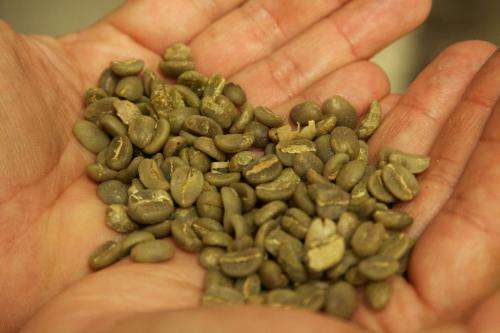Credit: McKay Savage
The efficacy of green coffee extract to impact on an independent risk factor for cardiovascular heart disease has been proven ineffective in mice models fed high fat diets (HFD) a recent study has shown.
The risk factor, endothelial dysfunction (ED), has also been associated with metabolic syndrome and type 2 diabetes, both disorders increasing rapidly in Australia.
UWA School of Medicine & Pharmacology's Natalie Ward says there is epidemiological evidence to suggest that increased coffee consumption may be protective against cardio vascular disease (CVD) and its risk factors, particularly type 2 diabetes.
"This study was designed to investigate whether green coffee bean extract could protect against the development of the metabolic syndrome, a cluster of CVD risk factors, as well as study the mechanisms involved in this process," Dr Ward says.
Thirty C57BL6 mice were divided into three groups of 10 and fed a normal diet, a HFD, and HFD with 0.5 per cent w/w green coffee bean extract (GCE).
The mice fed a HFD and HFD + GCE were found to display obesity, glucose intolerance, insulin resistance and oxidative stress, all symptoms of the metabolic syndrome.
What's in a cup of coffee?
The majority of phenolic compounds in coffee phenolic compounds in coffee comprise of chlorogenic acids (CGA) – which are also antioxidants – made of caffeoylquinic, feruloylquinic and dicaffeoylquinic acids in decreasing order of quantity.
Depending on brewing methods, a cup of coffee typically contains 70-200mg of CGA, with daily coffee drinkers consuming a total of 500-1000mg of CGA, whereas non-coffee drinkers less than 100mg.
Researchers isolated an extract from green coffee beans, which was found to be predominately chlorogenic acid, and fed the isolated compound to mice at an equivalent human coffee consumption rate of five cups of coffee per day.
"The study showed that green coffee bean extract had no beneficial effect in that they did not protect against development of features of the metabolic syndrome or prevent endothelial dysfunction in mice fed a high fat diet," Dr Ward says.
"This suggests that coffee does not confer a beneficial effect, although studies investigating whole coffee and/or pure coffee compounds are still warranted."
She says GCE supplements currently marketed as health supplements may not be effective to attenuate metabolic syndrome features of high fat diets—if the mice analogue is accurate for human populations.
"There are always limitations to using an animal study and the results and comparisons to humans should always be interpreted with caution," she says.
"Future studies should be extended to include whole coffee consumption, as well as consumption of pure compounds isolated from roasted coffee beans [the present study used unroasted coffee beans]—these studies should also be extended to humans."
More information: J.D. Li Kwok Cheong, K.D. Croft, P.D. Henry, V. Matthews, J.M. Hodgson, N.C. Ward, "Green coffee polyphenols do not attenuate features of the metabolic syndrome and improve endothelial function in mice fed a high fat diet," Archives of Biochemistry and Biophysics, Available online 25 February 2014, ISSN 0003-9861, dx.doi.org/10.1016/j.abb.2014.02.005.
Provided by Science Network WA























